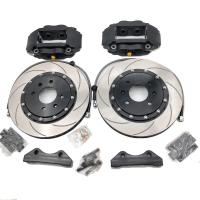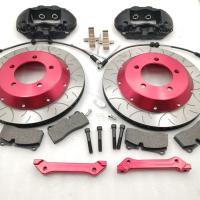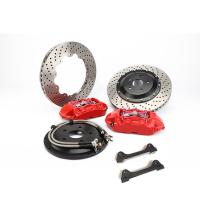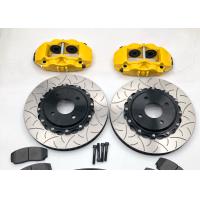| Sign In | Join Free | My himfr.com |
|
| Sign In | Join Free | My himfr.com |
|
| Ask Lasest Price | |
| Brand Name : | Jekit |
| Model Number : | JK7600 |
| Price : | Factory Price |
| Payment Terms : | Western Union, T/T,paypal, T/T |
| Supply Ability : | 600 sets per Month |
| Delivery Time : | 5-7work day |
Jekit car brake system caliper 285*24mm disc front wheel 15 rim
What are the major components of brake?
Drum brakes deserve more recognition than I’ll provide in this article, but due to the superior serviceability, heat rejection, and prevalence of disc brakes within the industry, that will be the focus. The major components include:
1. Brake rotors
The brake rotor is the spinning disc which rotates with the wheel;
this is used as a source to reject energy into, turning kinetic
energy into heat. As with all of the components listed here, there
will be one at each wheel.
2. Brake calipers
This is a mounted device which includes an internal piston that
applies pressure to the brake pad. Pressure occurs when you press
on the brake pedal, forcing brake fluid into the piston which
forces the brake pad against the rotor, slowing the vehicle and
creating heat.
3. Brake pads
The brake pad is a wearable part which contacts the brake rotor.
The pressure of the brake pad against the brake rotor, along with
the speed differential, is what allows your car to slow down.
4. Brake lines
These are the lines used to supply brake fluid to the brake
calipers. When you press the brake pedal, this pressurises the
brake fluid which travels through lines to each of the four wheels
to create forceful contact between the brake pad and the brake
rotor.
Why would you need to improve braking?
There are two primary reasons why you’d need to improve the braking performance of your vehicle:
1. Lack of stopping power
The vehicle does not have sufficient brake torque to lock up the
wheels at the speeds it travels (or get close to locking up the
wheels, providing the maximum deceleration forces).
2. Excessive brake fade
The vehicle experiences brake fade after certain durations of brake
use, and loses braking capabilities as a result. Prolonged braking
(such as on a track) can lead to brake fade as a result of improper
brake cooling.
How can you improve braking performance?
Before you get too excited about improving your car’s brakes, its critical to understand that brakes are only as good as the tyres and suspension allow them to be. If you’re running hard tyres that skip over every road imperfection, upgraded brakes will provide literally no improvement. Improvements in brake torque assume you’re not traction limited. Improvements in brake fade assume you actually get your brakes hot enough that they lose performance. For the vast majority of cars on public roads, stock brakes will be more than enough.
Getting to the point, there are four ways to improve brake torque:
1. Increase disc radius
Larger discs will allow for more brake torque as the brake pad will
apply pressure at a larger radius, allowing for a higher moment.
Brake torque is equal to the force applied by the pad multiplied by
the distance at which the force is applied from the center of the
wheel. In this case, we’re increasing the distance from the centre.
This is a good thing.
2. Increase caliper piston area
Increasing the size of the pistons (or number of pistons) means you
have more area applying a specific pressure. If pressure remains
constant and the area increases, the force applied will increase.
3. Line pressure
Push your foot harder, and the car brakes harder. This is because
the line pressure increases. If you can increase the line pressure
(perhaps by creating a larger lever arm for your brake pedal to act
upon, or using vacuum assist) you increase brake torque.
4. Friction coefficient between the pad and rotor
Perhaps self explanatory, but if you can increase the friction
(this comes down to material selection; brake pad manufacturers
will often supply this data) between the pad and the rotor, you can
increase the braking torque. With more friction comes more heat,
though, which brings us neatly on to
How do you reduce brake fade?
1. Larger rotors
Increasing the diameter or the width of the brake rotors means you
have more mass to reject heat into. This will improve brake fade,
assuming the brake rotors have proper cooling.
2. Vented rotors
Probably the most effective way of cooling brakes, allowing for
airflow within the center of the brake rotor allows for
significantly better cooling. Nearly all production cars have
vented rotors for the front discs, as the majority of braking is
accomplished by the front brakes.
3. Slotted and drilled rotors
The purpose of slotted or drilled brakes is to allow for the escape
of gases and particles created by the brake pads during use. With
plain rotors, this layer of gases can prevent perfect contact
between the pad and rotors. Slotted rotors are the preferred method
here, as drilled rotors tend to prematurely fail due to the stress
rises associated with the drilled holes. Aside from drifting (where
braking is minimal) you won’t see drilled rotors in motorsport.
4. Brake pad selection
It’s critical to select brake pads based on the application. Some
brake pads will have a high frictional coefficient at cold
temperatures (lots of bite before being warmed up), where as others
will be more effective at higher temperatures. Brake pads can be
purchased for various operating temperature ranges, and this should
be considered based on the application. Road cars have high initial
bite, but lose performance as they warm up. Racing pads tend to
operate at higher frictional coefficients for a wider range of high
temperatures, making them ideal for tracking with intensive
braking.
5. Brake air ducts
Extremely common in racing and gaining popularity in road cars,
brake ducts are simply vents that channel the airflow hitting the
car so that it blows cool air into the wheel wells and ideally onto
the brake rotors.
6. Colour
Sure, red brakes make everything better, but no one ever teaches
you which hue of red. Let it be known experts unanimously agree
(really just myself) that fire engine red is the best for potent
brakes. Stops fires. Stops your car.
FAQ
Q: Are you a manufacturer or trade company ?
A: We are from factory directly, and we also have sales office in
Guangzhou
Q:OEM/ODM Service
A:Our professional R&D department could develop different
products according to your requirements .
Q: Samples are available
A:We could offer you samples to test quality , but you need to bear
the sample fee and freight charge .
Q: Custom packing service?
A:No matter the inner packing or the outer carton , we can design
as your request .
Q:Quality Control
A:We make sure that all our Brake calipers are 100% tested.
Q:Quickly response
A:All your requests will be replied within 12 working hours .
2-Piece Forged Body 4-Piston Front Caliper Material Aerial Aluminum 6082 Alloy Craft 2-Piece Forged Body+CNC Color Red/Yellow/Blue/Green/Silver/Black Finish Treatment High-temperature Baking Coating Fitting Disc Size 285/295/300/330mm |




|




